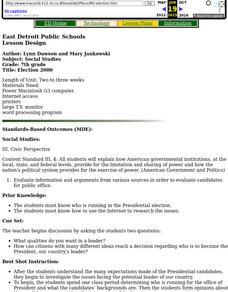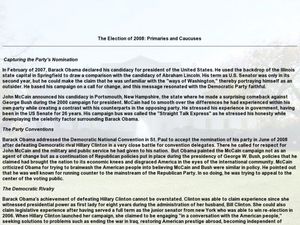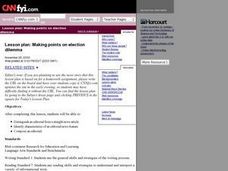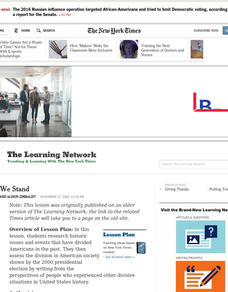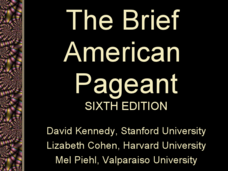Curated OER
The Brief American Pageant: The Stalemate Seventies
A glimpse of the political and economic contexts of the 1970's, this series of slides includes two graphs (median family income and Consumer Price Index) and a map that details the results of the 1972 Nixon-McGovern Presidential...
Curated OER
Youth voters and election turnout
Students investigate why 18- to 24- year-olds have a low turnout at the polls. Students develop a plan to encourage young Americans to vote, or write a persuasive essay telling why they should vote.
Curated OER
Hail to the Chief
Pupils explore how the New York Times has represented presidential victories on its front page throughout the 20th century.
Curated OER
Un-Presidented Election
Students explore the results of the 2000 presidential election. They look back at important issues in the campaign and write newspaper articles which cover specific angles on the election.
Curated OER
Results In On Mock Election
Students examine the two presidential candidates in 2000, and identify their own stance on campaign issues. They create fictional candidates that represent their beliefs, and write campaign speeches from their point of view.
Curated OER
Election 2000
Seventh graders explore issues facing the potential leader of our country, form opinions about the candidates representing the two major political parties, research election material and choose candidates, conduct debates, and vote in...
Curated OER
Down for the Count?
The New York Times article “Supreme Court, Split 5-4, Halts Florida Count in Blow to Gore” provides the opening to an assessment of the United States Supreme Court decision in the case of the 2000 presidential election. Assuming the...
Curated OER
The Election of 2008: Primaries and Caucuses
Students examine the American presidential election process. In this presidential election instructional activity, students discover details regarding the campaigns of McCain and Obama in the 2008 election. Students create timelines that...
Curated OER
Campaign 2000
Students research newspapers and the Internet to learn about the election. Students work in groups and choose a state that they want to compare to Florida. Students organize the data they have found into a graph labeling an "x" and "y"...
C-SPAN
Debates
How do the presidential debates of 2016 compare to the debates from the 1980's? What about the 1960's? Evaluate a chosen candidate or issue from the 20th and 21st centuries with a lesson plan focused on political debates. Middle and high...
Curated OER
Making Points on Election Dilemma
Students define a straight news article, and identify characteristics of an editorial news feature. They read a CNN article that examines the 2000 presidential election, and determine what is factual and what is opinion.
Curated OER
Why Bother To Vote In Florida?
Fifth graders gain knowledge about the Florida 2000 Presidential Election, proposed changes in the process, and to practice communication skills, including listening and speaking. This lesson really gets at the heart of the changes made...
Curated OER
Lesson Plan: Bringing Out the Vote
Pupils explore voter turnout, analyzing why Americans don't vote, and citizen activism through creating community publicity about the 2004 Presidential election.
Curated OER
The Electoral Process
Students study the history and mechanics of the Electoral College and formulate opinions as to whether this institution should be preserved, modified or eliminated. They compare and contrast electoral and popular votes in the...
Curated OER
US Presidents
Students work in small groups to analyze various presidential campaigns. In this presidential election lesson, students research election rules, candidates, and winners from 1900 to 2000. Students will create and present an oral report...
Curated OER
Reading Comprehension: Who Elects the President?
In this reading comprehension instructional activity, students read a text about the presidential election in 2000. Students fill in 10 blanks, choosing from 4 words for each that will make the text make sense.
Curated OER
CIVICS AND HISTORY LESSON
Students conduct research using recommended websites and other appropriate resources. Based on their findings, groups prepare recommendations for future elections to ensure efficiency and fairness. students must refer to the 2000 election.
Curated OER
Divided We Stand
Students research historic issues and events that have divided Americans in the past. They assess the division in American society shown by the 2000 presidential election by writing from the perspectives of people who have seen other...
Curated OER
The Brief American Pageant: The Resurgence of Conservatism
Take a short trip back in time with this presentation, which details the political and electoral contexts of 1980's and 1990's America. Covering the Gulf War as well as domestic economics, these slides feature easy-to-read charts and...
Curated OER
Evaluation of Election Process
Students examine the procedures to elect the President of the United States. In groups, they create their own political cartoon presenting a consensus of their point of views on the process. They identify the strengths and weaknesses...
Curated OER
Rocking the Vote
Students explore how a presidential candidate can win the popular vote but not receive enough electoral votes to win the election. They analyze various regions' voting trends, explore how these trends reflect the outcome of the 2004...
Curated OER
Who Should Be Number 2?
Pupils explore role of the vice president and the qualities that a presidential candidate must look for while choosing his or her running mate.
Curated OER
All Aboard The Campaign Train!
Learners explore campaign politics. In this political campaign lesson, students investigate multimedia sources in order to examine the structure of political parties and platforms from previous presidential elections. Learners then...
Curated OER
The Electoral College
Students examine the Electoral College's role in the election process. They conduct Internet research, and identify the elections in which the Electoral College played a deciding role.







